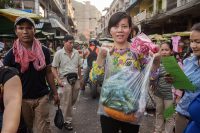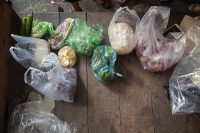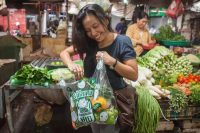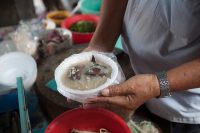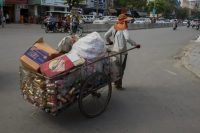Quicksand took a human-centered approach to tackling plastic pollution in Cambodia, working to understand the deep-rooted cultural and behavioral patterns behind plastic bag use. Through immersive research across Phnom Penh, Siem Reap, and Sihanoukville, we engaged with key stakeholders — from consumers and vendors to waste workers and policymakers — to uncover the real drivers of plastic dependency. By mapping usage patterns and environmental impact, we built a framework that guided the prototyping of practical, locally-relevant alternatives. Tested in real-world settings like wet markets, our solutions responded to existing habits while aiming for systemic change. The result: a grounded strategy for plastic reduction that balances environmental urgency with everyday Cambodian realities.
excess-baggage
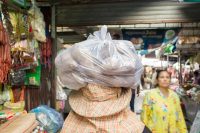
Client
- Fondazione ACRA
Sector
- Social Innovation
Services
- Environment
- Circular Economy
Plastic bags are deeply embedded in the everyday lives of Cambodians. Found everywhere, from bustling markets to quiet homes, they represent more than just convenience; they are a sign of a society in transition. Yet, this convenience comes at a heavy environmental cost.
Cambodia, like many of its neighbors, faces a growing plastic pollution problem. Streets, waterways, and landfills are increasingly clogged with plastic waste, highlighting the urgent need for action. Funded by the European Union through the Switch Asia Programme, and implemented by ACRA along with national and local government bodies, Quicksand was tasked with envisioning a strategy to reduce the negative impact of plastic bags in Cambodia’s major cities.
Where We Began
The first step was understanding the depth and complexity of plastic bag usage. Global experiences show that simply banning or taxing bags isn’t enough, solutions needed to be rooted in local behavior, attitudes, and needs.
Quicksand’s approach centered around ensuring that solutions were shaped by the people who live, sell, shop, and work in Cambodia. We believed that true change would depend on these people - consumers, vendors, waste workers, and many others, embracing new behaviors and systems.
Digging Deep: How We Did It
Our research focused on the real-world habits and motivations behind plastic bag use across three major cities: Phnom Penh, Siem Reap, and Sihanoukville. We worked closely with four key groups:
- Retailers and Wholesalers
- Consumers and End Users
- Plastic Bag Suppliers and Producers
- Waste Managers and Recyclers
To build a complete picture, we also held conversations with experts across sectors — from environmental scientists to policy makers — exploring topics like the environmental and health impact of plastics, emerging alternatives, trends in retail and consumption, Cambodia’s economic activity and governance structures and the role of community networks.
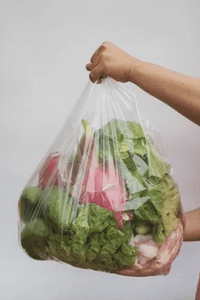

We knew from the start that displacing plastic bags would not be easy. Plastic is cheap, functional, and deeply entrenched in modern consumption habits. Any alternative would need to offer comparable (if not better) levels of convenience, accessibility, visibility, and affordability.
We designed a range of solutions — from new materials and products to changes in services and systems — and tested them directly in Cambodian markets. This helped us to understand, refine, and iterate based on real-time feedback from users.
One example of a focus area was buying perishables at local wet markets, which represented an opportunity to change daily habits especially of older women shoppers and vendors. Here, we saw a strong chance to reduce the use of cheap, colored plastic bags, as long as new ideas respected existing reuse habits and market realities.
By placing the daily realities, motivations, and behaviors of Cambodian consumers and retailers at the heart of our research and design efforts, we were able to uncover insights that traditional top-down approaches often miss. Behavioral research and design allowed us to move beyond surface-level assumptions, recognizing, for example, the entrepreneurial spirit of micro-retailers, the deep-rooted rituals around market shopping, and the surprisingly positive perceptions thatplastic bags have when it comes to aspects of customer service. This grounded understanding shaped solutions that are not only environmentally viable, but also socially and culturally resonant, ensuring a higher chance of adoption and real, sustained impact.
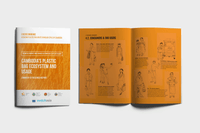
Related

Improving Data Quality in HMIS
Enhancing data quality for smarter public health decisions
